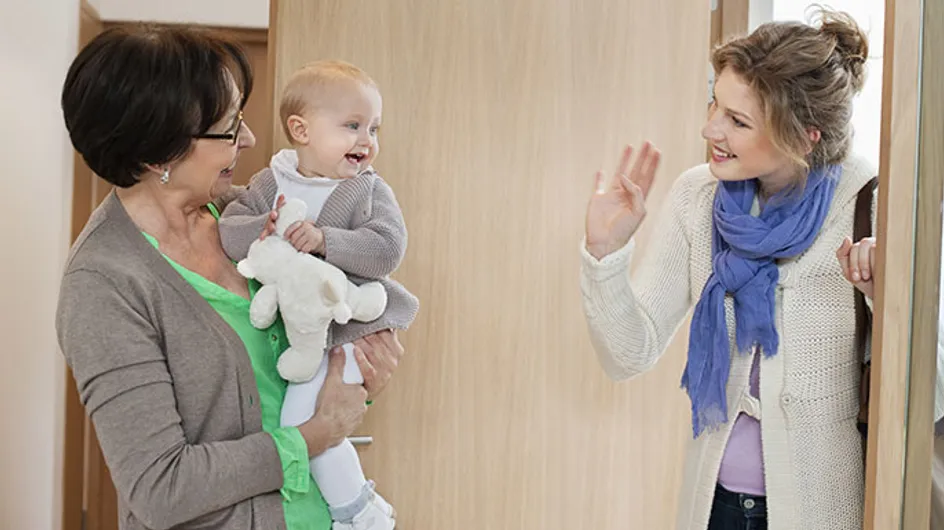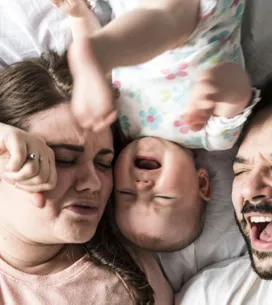The first day of school or the first night out without the little one is a big deal for any mum and if you thought you were the only one that sat in the car for an hour after dropping them off, hugging the steering wheel, then think again. Letting go of your child for a few hours is an emotional ask but with the right frame of mind you can make the transition as smooth as possible for you and your child.
We spoke to clinical psychologist and mother, Dr. Laura Markham, author of Peaceful Parent, Happy Kids: How to Stop Yelling and Start Connecting, about how to deal with your separation anxiety.
First things first mums, it is perfectly normal to miss your child to the point of anxiety and near dread the first time you leave and Dr. Laura can vouch for that, “It’s programmed by Mother Nature, into all mothers.
“Children are designed to seek connection and their entire development hinges on having a healthy emotional and physical connection with their parents, or with some significant other who will look out for them. Of course the opposite, therefore has to be true. If we we're immune to the calls of our child, the human race wouldn’t have survived.”
There, you see! It’s biological to worry, but don’t let it bog you down. If your child is anxious or stressed to be leaving you it will naturally rub off on you or vice versa.
Acknowledge your feelings
Dr. Laura says, “I think the first thing a mum has to do is notice her own feelings. Just stop and imagine dropping your child off at school for the first time (if that’s what’s happening) and imagine what will happen. Notice where your fears are.”
Realise what you are afraid of and then accept that most of your fears are completely unfounded. With great childcare and support, they will be just fine. Anxiety is completely normal, and as Dr. Laura says, acknowledging your feelings will help you to deal with them more easily.
Sigrid Daniel, parenting expert at Care.com, says that you should also learn to trust your decision making, "If you are consistently sensible about the people and places that you expose your children to, they will learn to trust your choices and develop their own good “gut instinct” and resilience."
Bond with the caregiver
One of the best things you can do to ease separation anxiety is to help your child bond with the caregiver. If the babysitter gets to know your child before you leave them alone, they will already have an idea of how to comfort and care for your little one. With that in mind, you will be less anxious and stressed about leaving them in someone else's care.
Dr. Laura says, “Kids don’t just get used to doing without parents or a parent-figure. They’re actually designed to need an adult to rely on.
"You want to take a step back and not be part of it, so they actually get engaged with the caretaker and see themselves in this situation. Your kid is still going to protest your leaving, but if they have bonded with the caregiver, the caregiver should be able to comfort your child.”
Take pictures
When you’re first visiting the space or person you’ll be leaving your child with, be sure to snap plenty of photos. One of Dr. Laura's tips is to take a picture of your child with their caregiver, put it on your fridge and actually talk to it.
“You basically want to create a warm feeling towards the caregiver on the part of your child, and you do that by projecting warmth,” she explains.
Pictures aren’t just good for getting your child comfortable with a person, but also with whatever space they may be left in. If they are going to daycare, take a few pictures of the play space. The more familiar the place is when they are left alone, the more likely they will feel comfortable there.
Have a routine
Another very important tip Dr. Laura has for both you and your child is to make a goodbye routine.
“You want to have the same thing happen,” she says. “If your daughter thinks she can scream and yell to try and get you to stay, she’ll do it every day. Why wouldn't she? You want to explain to her what’s going to happen, and then you want to do it that way every single day, even if she cries.”
Your routine could consist of anything, but Dr. Laura thinks a big hug and a specific parting phrase are good examples. You could say "see you later, alligator" or some other cute phrase your child can easily remember. The sillier the better, that way they won't concentrate on the separation itself.
It's really important to let your child know that you will come back, “and you need to say it all the time, not just when you’re dropping your kid off. You should be saying it when your child is a tiny baby so they really get this in their bones."
With that kind of trust, it is easier for a child to deal with their own separation anxiety, and if you know your baby isn’t at home missing you, you will feel that much better too.
Don’t forget to practice your parting routine before dropping your child off for the first time, so they know exactly what to expect.
Sigrid also recommends that you make the transition as playful as possible, "Make the walk to your childminder’s fun, or greet your nanny with a cheerful smile and a story about what your child has been up to that day."
Don't be late!
In our busy world, it can be difficult to be on time, but when you or your child are dealing with separation anxiety, don’t be late picking your child up.
“When you come back be early,” Dr. Laura says. “Never be late, because it stimulates more separation anxiety.”
Don’t let yourself sneak out when dropping your child off, either. While it is so tempting to run out and not endure the oncoming tears, leaving when your child’s back is turned is worse in the long run. Stick around, through the tears, and make sure your child knows when you’ll be back.
How do you deal with separation anxiety? Tweet us @sofeminineUK

















